Supply Chain Manager Resume Examples

Jul 18, 2024
|
12 min read
Crack the code: Boost your supply chain manager resume with these tips to land your ideal job. Learn how to detail your skills, experience, and knowledge to become the “link” every company needs.
Rated by 348 people
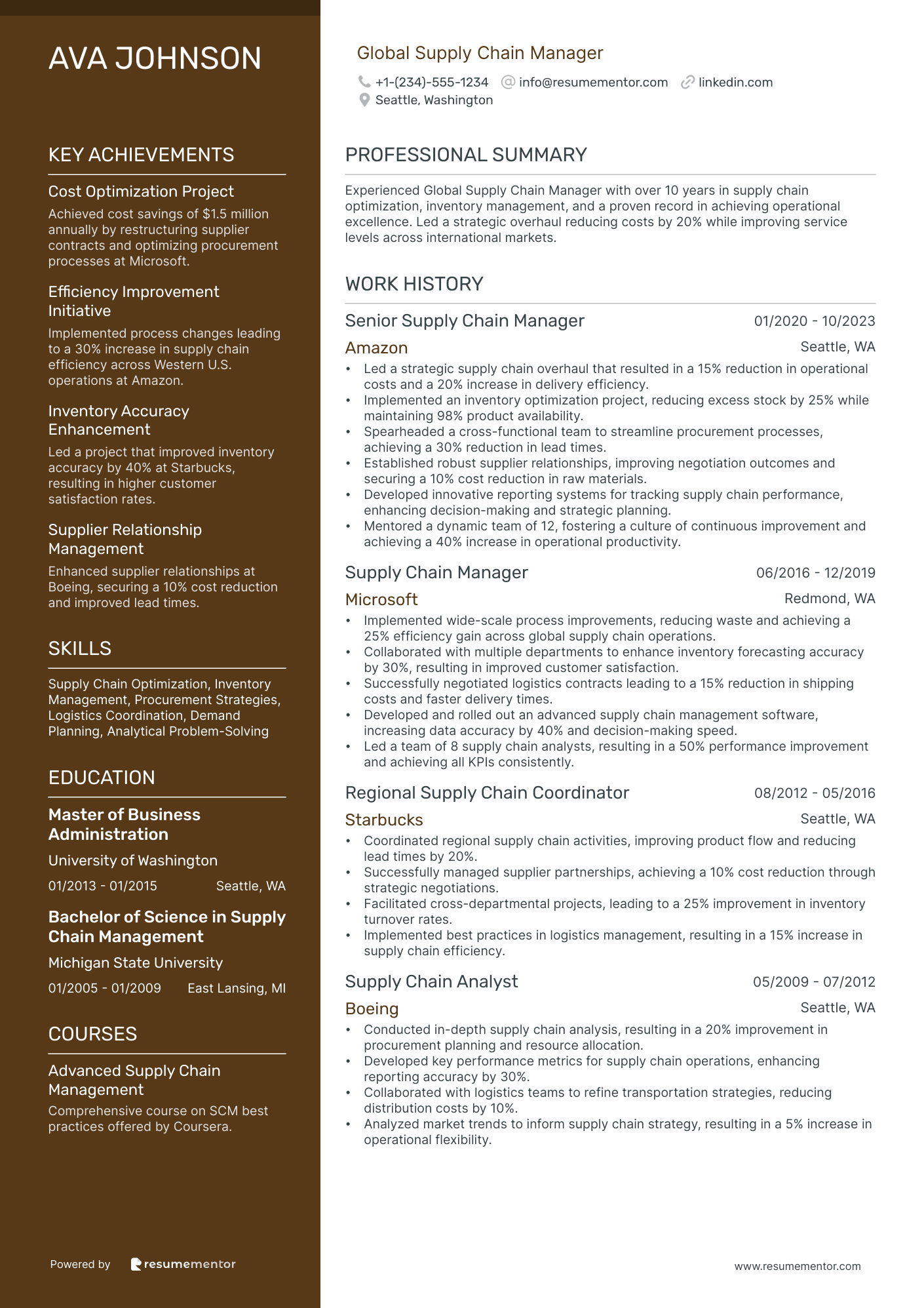
Global Supply Chain Manager
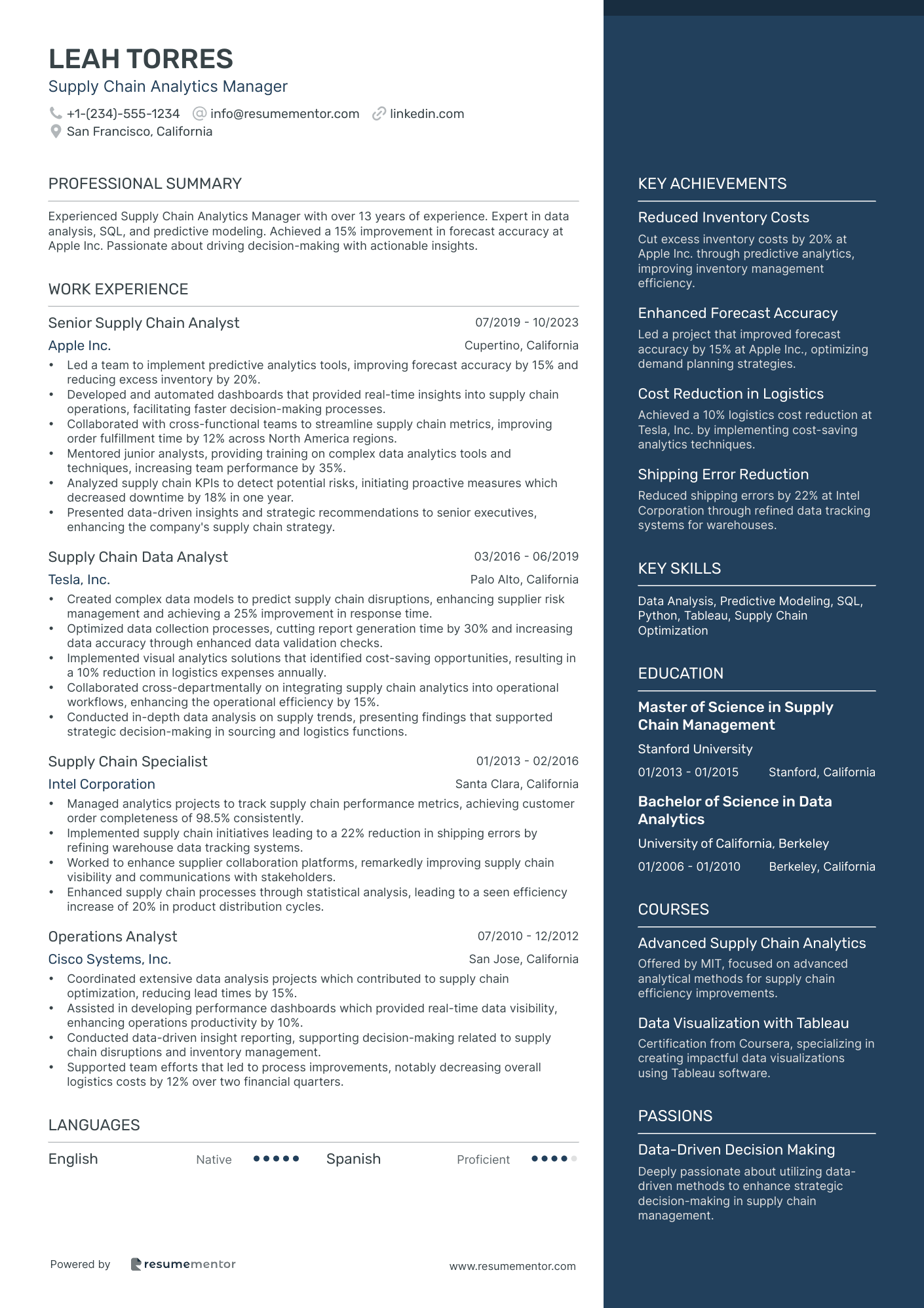
Supply Chain Analytics Manager
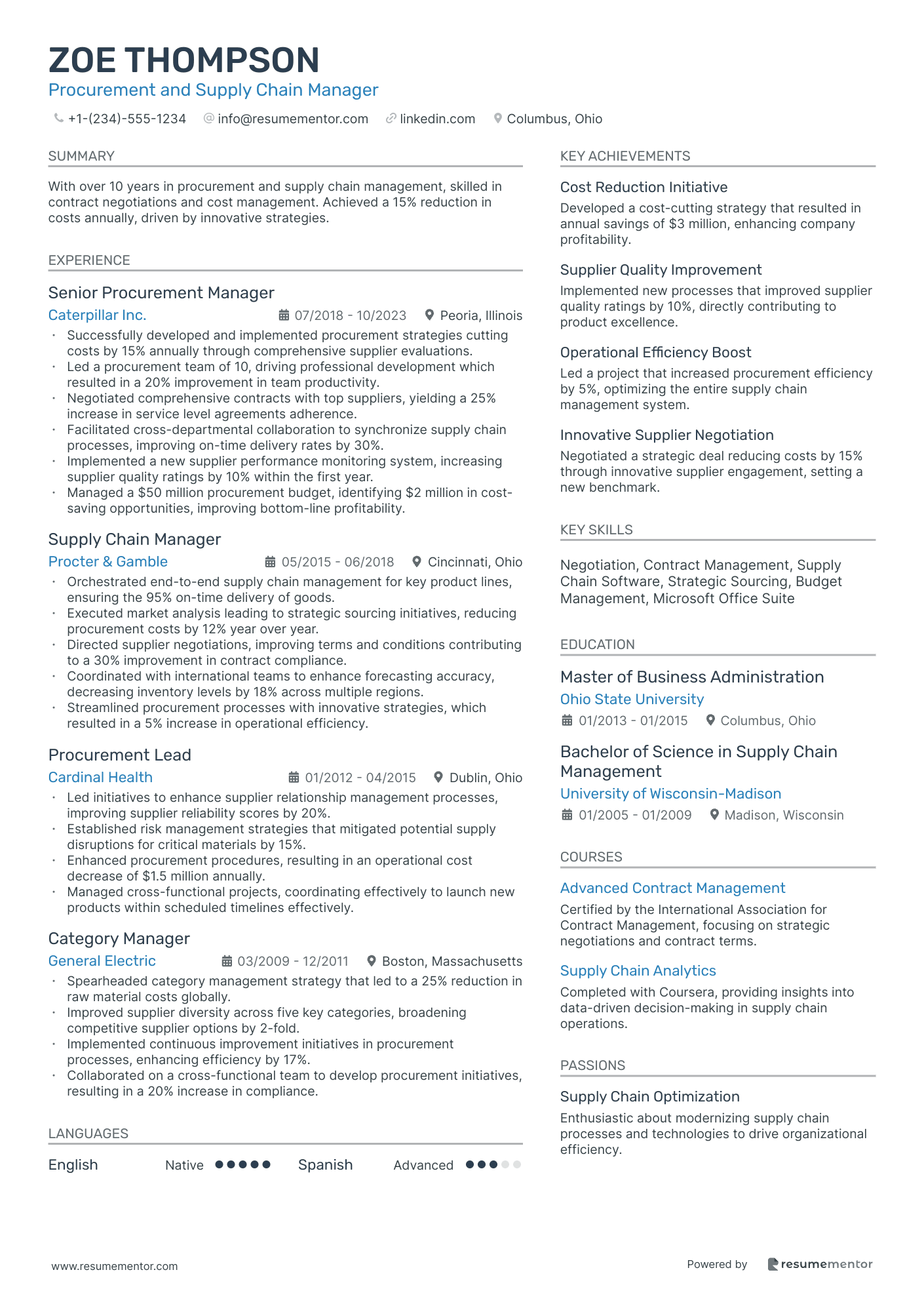
Procurement and Supply Chain Manager
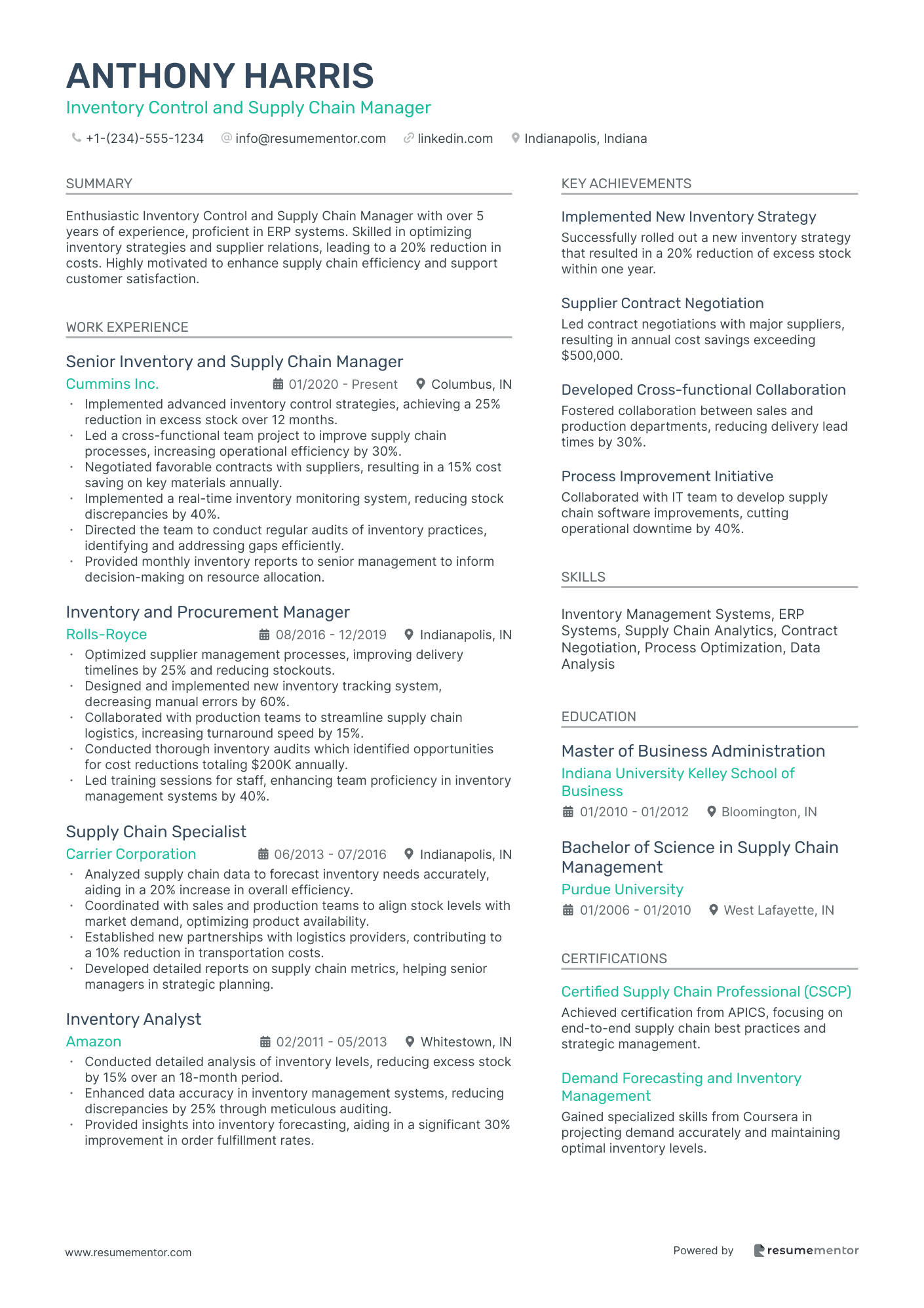
Inventory Control and Supply Chain Manager
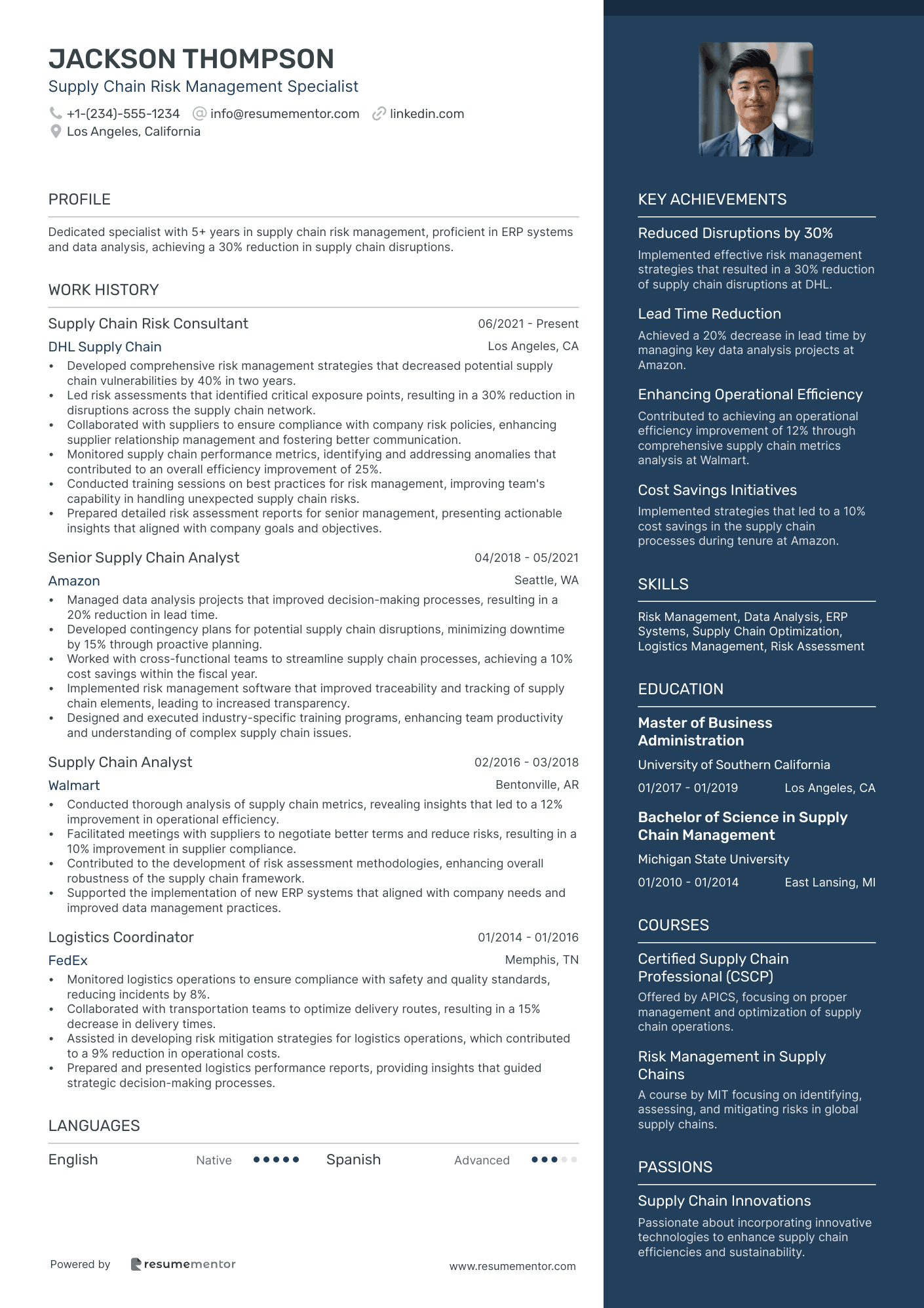
Supply Chain Risk Management Specialist
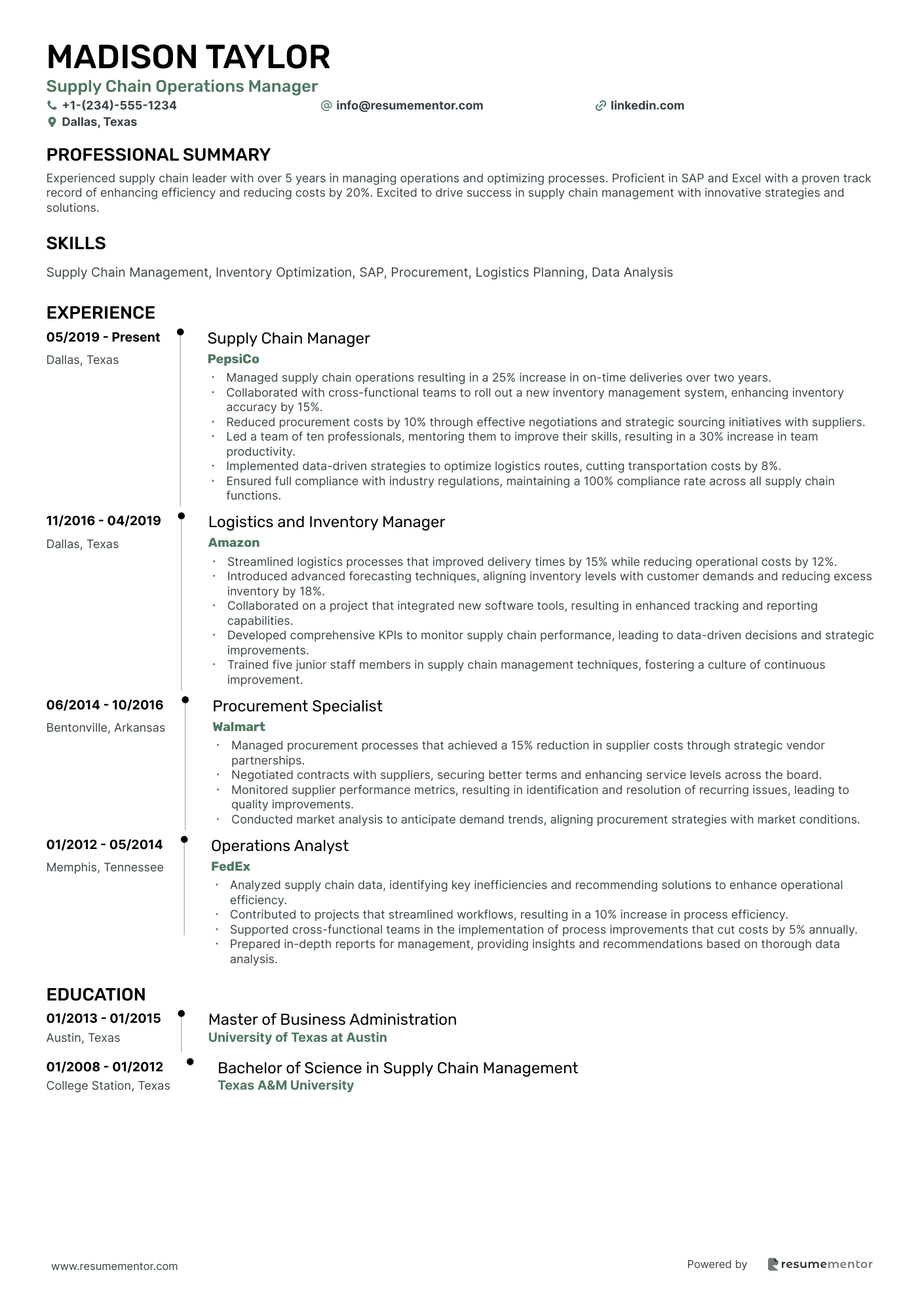
Supply Chain Operations Manager
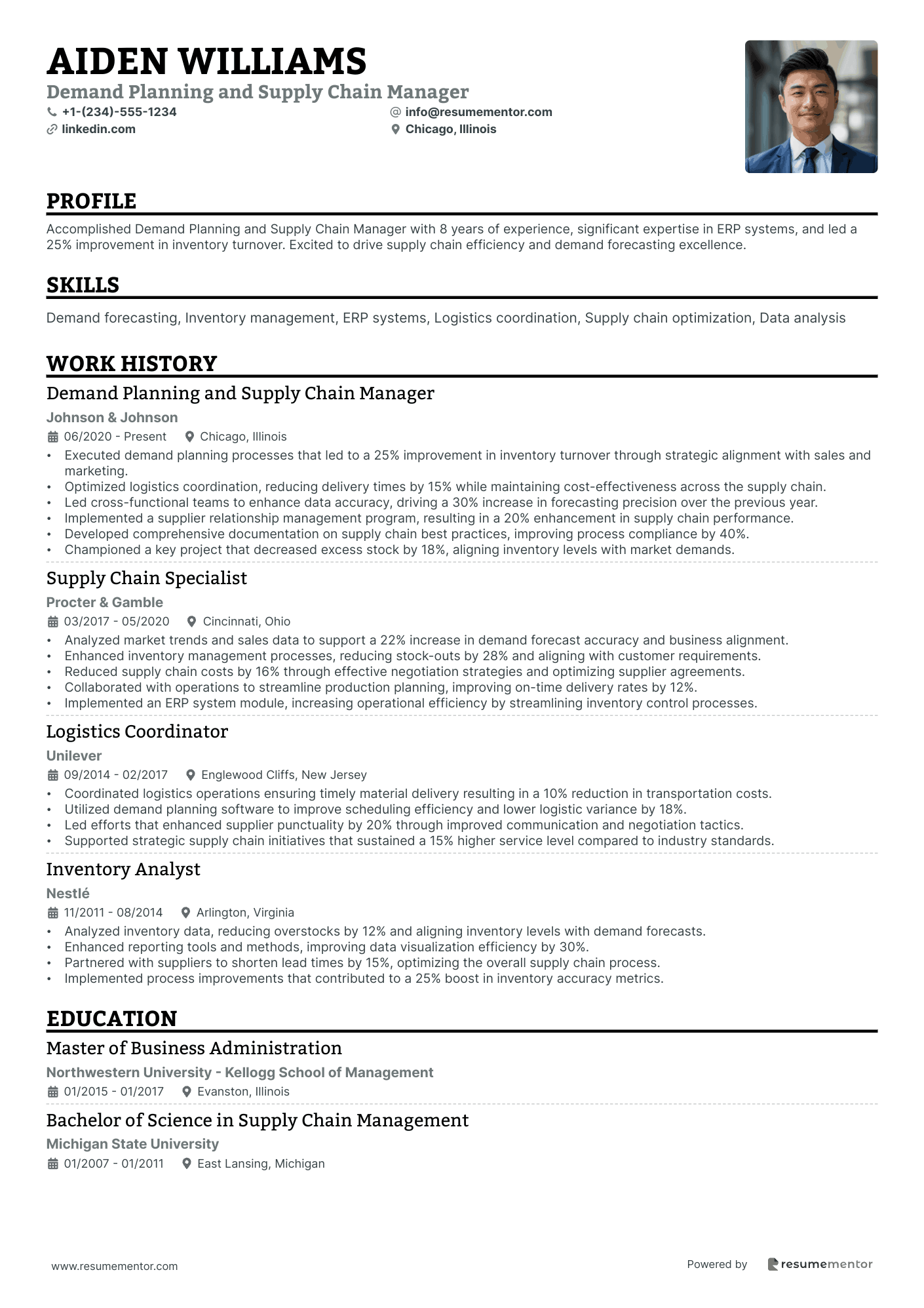
Demand Planning and Supply Chain Manager
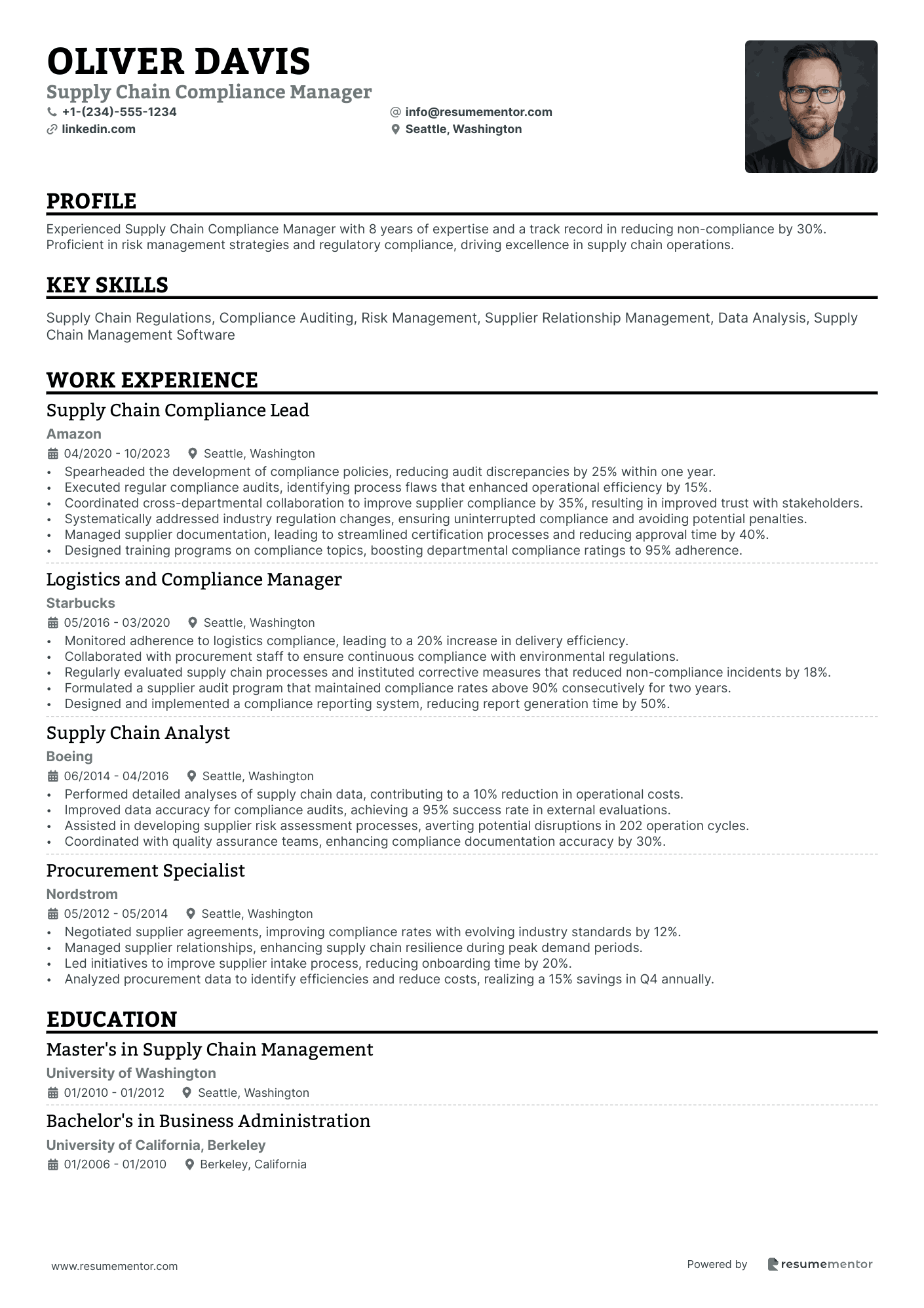
Supply Chain Compliance Manager
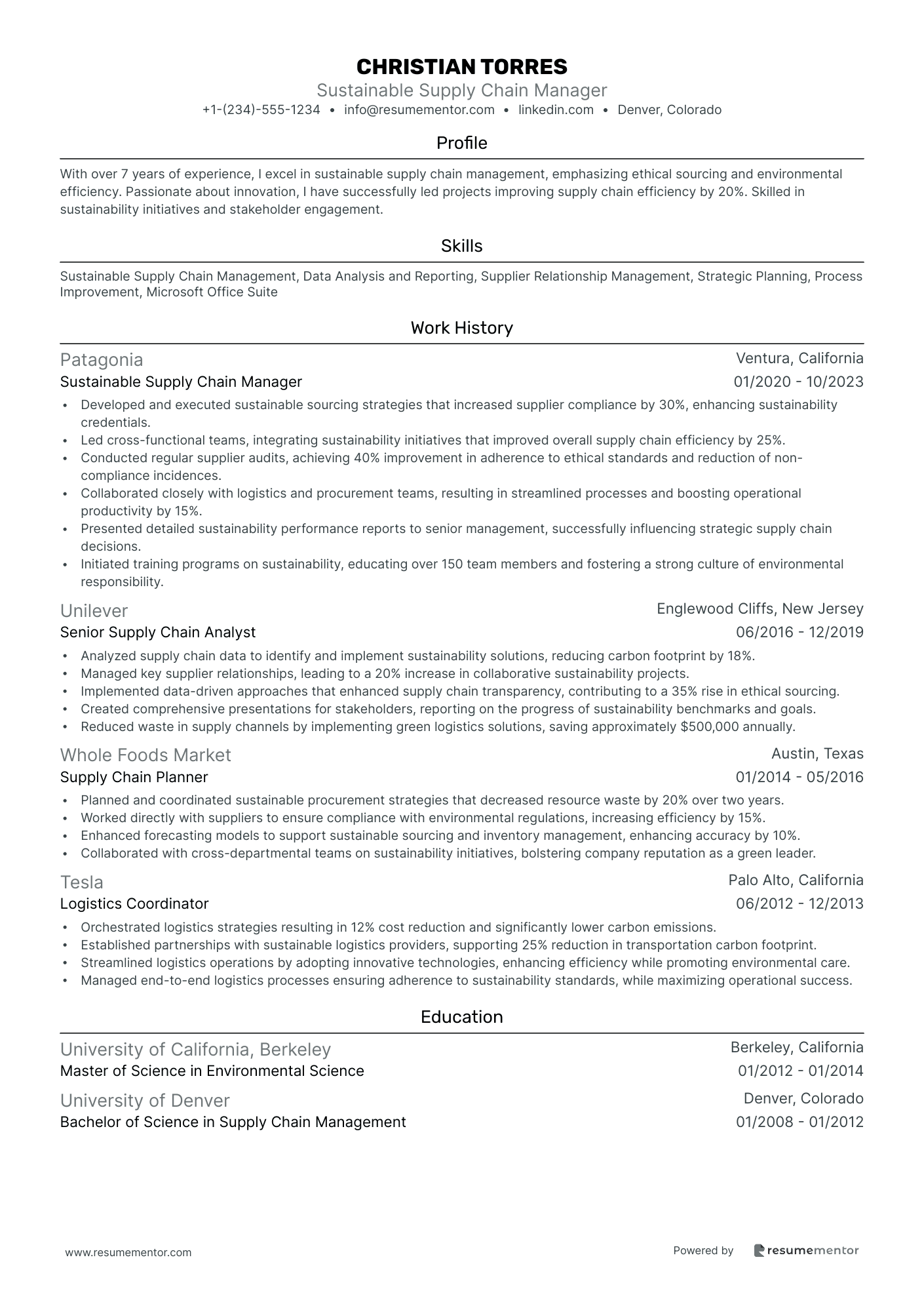
Sustainable Supply Chain Manager
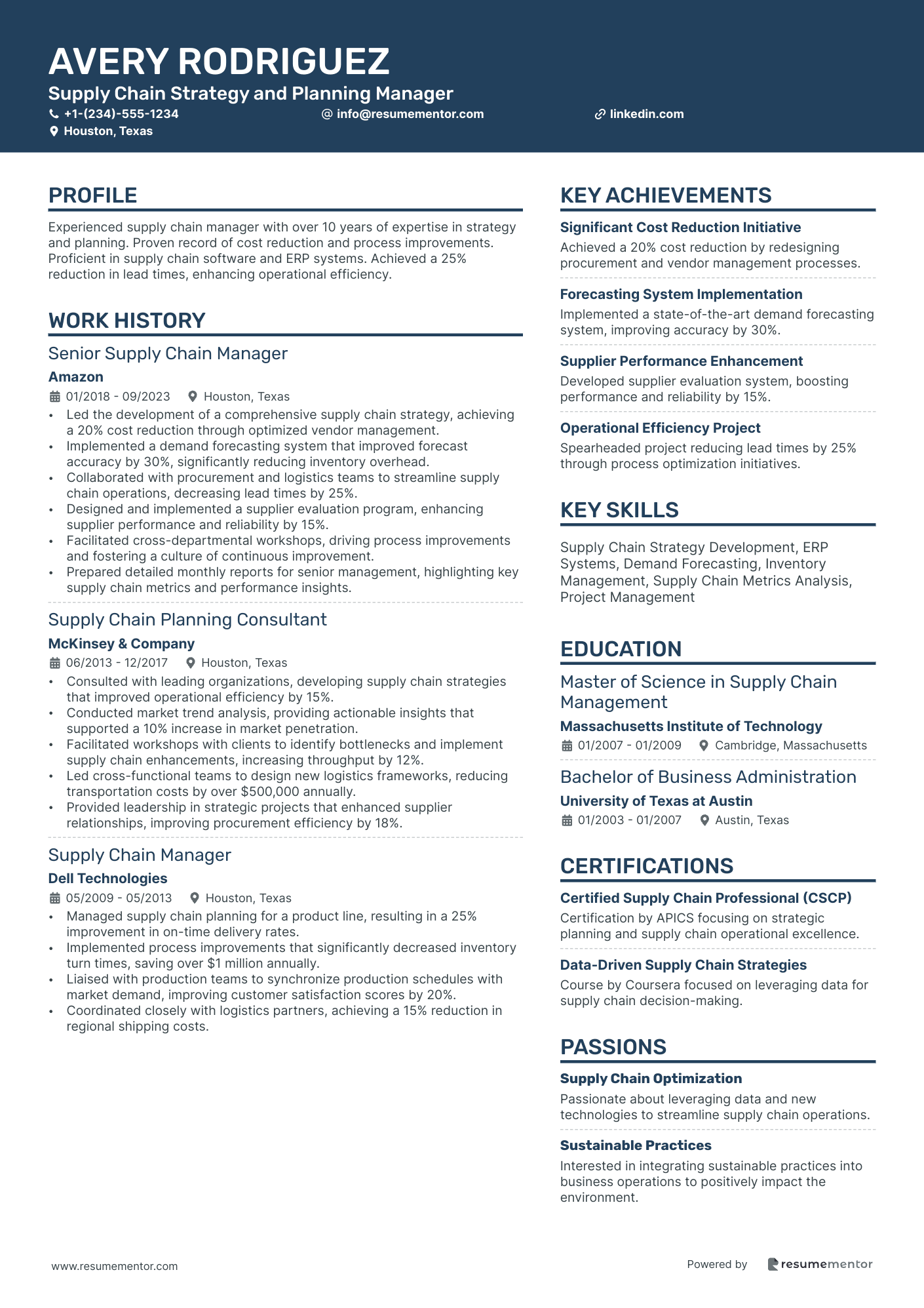
Supply Chain Strategy and Planning Manager

Global Supply Chain Manager resume sample
- •Led a strategic supply chain overhaul that resulted in a 15% reduction in operational costs and a 20% increase in delivery efficiency.
- •Implemented an inventory optimization project, reducing excess stock by 25% while maintaining 98% product availability.
- •Spearheaded a cross-functional team to streamline procurement processes, achieving a 30% reduction in lead times.
- •Established robust supplier relationships, improving negotiation outcomes and securing a 10% cost reduction in raw materials.
- •Developed innovative reporting systems for tracking supply chain performance, enhancing decision-making and strategic planning.
- •Mentored a dynamic team of 12, fostering a culture of continuous improvement and achieving a 40% increase in operational productivity.
- •Implemented wide-scale process improvements, reducing waste and achieving a 25% efficiency gain across global supply chain operations.
- •Collaborated with multiple departments to enhance inventory forecasting accuracy by 30%, resulting in improved customer satisfaction.
- •Successfully negotiated logistics contracts leading to a 15% reduction in shipping costs and faster delivery times.
- •Developed and rolled out an advanced supply chain management software, increasing data accuracy by 40% and decision-making speed.
- •Led a team of 8 supply chain analysts, resulting in a 50% performance improvement and achieving all KPIs consistently.
- •Coordinated regional supply chain activities, improving product flow and reducing lead times by 20%.
- •Successfully managed supplier partnerships, achieving a 10% cost reduction through strategic negotiations.
- •Facilitated cross-departmental projects, leading to a 25% improvement in inventory turnover rates.
- •Implemented best practices in logistics management, resulting in a 15% increase in supply chain efficiency.
- •Conducted in-depth supply chain analysis, resulting in a 20% improvement in procurement planning and resource allocation.
- •Developed key performance metrics for supply chain operations, enhancing reporting accuracy by 30%.
- •Collaborated with logistics teams to refine transportation strategies, reducing distribution costs by 10%.
- •Analyzed market trends to inform supply chain strategy, resulting in a 5% increase in operational flexibility.
Supply Chain Analytics Manager resume sample
- •Led a team to implement predictive analytics tools, improving forecast accuracy by 15% and reducing excess inventory by 20%.
- •Developed and automated dashboards that provided real-time insights into supply chain operations, facilitating faster decision-making processes.
- •Collaborated with cross-functional teams to streamline supply chain metrics, improving order fulfillment time by 12% across North America regions.
- •Mentored junior analysts, providing training on complex data analytics tools and techniques, increasing team performance by 35%.
- •Analyzed supply chain KPIs to detect potential risks, initiating proactive measures which decreased downtime by 18% in one year.
- •Presented data-driven insights and strategic recommendations to senior executives, enhancing the company's supply chain strategy.
- •Created complex data models to predict supply chain disruptions, enhancing supplier risk management and achieving a 25% improvement in response time.
- •Optimized data collection processes, cutting report generation time by 30% and increasing data accuracy through enhanced data validation checks.
- •Implemented visual analytics solutions that identified cost-saving opportunities, resulting in a 10% reduction in logistics expenses annually.
- •Collaborated cross-departmentally on integrating supply chain analytics into operational workflows, enhancing the operational efficiency by 15%.
- •Conducted in-depth data analysis on supply trends, presenting findings that supported strategic decision-making in sourcing and logistics functions.
- •Managed analytics projects to track supply chain performance metrics, achieving customer order completeness of 98.5% consistently.
- •Implemented supply chain initiatives leading to a 22% reduction in shipping errors by refining warehouse data tracking systems.
- •Worked to enhance supplier collaboration platforms, remarkedly improving supply chain visibility and communications with stakeholders.
- •Enhanced supply chain processes through statistical analysis, leading to a seen efficiency increase of 20% in product distribution cycles.
- •Coordinated extensive data analysis projects which contributed to supply chain optimization, reducing lead times by 15%.
- •Assisted in developing performance dashboards which provided real-time data visibility, enhancing operations productivity by 10%.
- •Conducted data-driven insight reporting, supporting decision-making related to supply chain disruptions and inventory management.
- •Supported team efforts that led to process improvements, notably decreasing overall logistics costs by 12% over two financial quarters.
Procurement and Supply Chain Manager resume sample
- •Successfully developed and implemented procurement strategies cutting costs by 15% annually through comprehensive supplier evaluations.
- •Led a procurement team of 10, driving professional development which resulted in a 20% improvement in team productivity.
- •Negotiated comprehensive contracts with top suppliers, yielding a 25% increase in service level agreements adherence.
- •Facilitated cross-departmental collaboration to synchronize supply chain processes, improving on-time delivery rates by 30%.
- •Implemented a new supplier performance monitoring system, increasing supplier quality ratings by 10% within the first year.
- •Managed a $50 million procurement budget, identifying $2 million in cost-saving opportunities, improving bottom-line profitability.
- •Orchestrated end-to-end supply chain management for key product lines, ensuring the 95% on-time delivery of goods.
- •Executed market analysis leading to strategic sourcing initiatives, reducing procurement costs by 12% year over year.
- •Directed supplier negotiations, improving terms and conditions contributing to a 30% improvement in contract compliance.
- •Coordinated with international teams to enhance forecasting accuracy, decreasing inventory levels by 18% across multiple regions.
- •Streamlined procurement processes with innovative strategies, which resulted in a 5% increase in operational efficiency.
- •Led initiatives to enhance supplier relationship management processes, improving supplier reliability scores by 20%.
- •Established risk management strategies that mitigated potential supply disruptions for critical materials by 15%.
- •Enhanced procurement procedures, resulting in an operational cost decrease of $1.5 million annually.
- •Managed cross-functional projects, coordinating effectively to launch new products within scheduled timelines effectively.
- •Spearheaded category management strategy that led to a 25% reduction in raw material costs globally.
- •Improved supplier diversity across five key categories, broadening competitive supplier options by 2-fold.
- •Implemented continuous improvement initiatives in procurement processes, enhancing efficiency by 17%.
- •Collaborated on a cross-functional team to develop procurement initiatives, resulting in a 20% increase in compliance.
Inventory Control and Supply Chain Manager resume sample
- •Implemented advanced inventory control strategies, achieving a 25% reduction in excess stock over 12 months.
- •Led a cross-functional team project to improve supply chain processes, increasing operational efficiency by 30%.
- •Negotiated favorable contracts with suppliers, resulting in a 15% cost saving on key materials annually.
- •Implemented a real-time inventory monitoring system, reducing stock discrepancies by 40%.
- •Directed the team to conduct regular audits of inventory practices, identifying and addressing gaps efficiently.
- •Provided monthly inventory reports to senior management to inform decision-making on resource allocation.
- •Optimized supplier management processes, improving delivery timelines by 25% and reducing stockouts.
- •Designed and implemented new inventory tracking system, decreasing manual errors by 60%.
- •Collaborated with production teams to streamline supply chain logistics, increasing turnaround speed by 15%.
- •Conducted thorough inventory audits which identified opportunities for cost reductions totaling $200K annually.
- •Led training sessions for staff, enhancing team proficiency in inventory management systems by 40%.
- •Analyzed supply chain data to forecast inventory needs accurately, aiding in a 20% increase in overall efficiency.
- •Coordinated with sales and production teams to align stock levels with market demand, optimizing product availability.
- •Established new partnerships with logistics providers, contributing to a 10% reduction in transportation costs.
- •Developed detailed reports on supply chain metrics, helping senior managers in strategic planning.
- •Conducted detailed analysis of inventory levels, reducing excess stock by 15% over an 18-month period.
- •Enhanced data accuracy in inventory management systems, reducing discrepancies by 25% through meticulous auditing.
- •Provided insights into inventory forecasting, aiding in a significant 30% improvement in order fulfillment rates.
Supply Chain Risk Management Specialist resume sample
- •Developed comprehensive risk management strategies that decreased potential supply chain vulnerabilities by 40% in two years.
- •Led risk assessments that identified critical exposure points, resulting in a 30% reduction in disruptions across the supply chain network.
- •Collaborated with suppliers to ensure compliance with company risk policies, enhancing supplier relationship management and fostering better communication.
- •Monitored supply chain performance metrics, identifying and addressing anomalies that contributed to an overall efficiency improvement of 25%.
- •Conducted training sessions on best practices for risk management, improving team's capability in handling unexpected supply chain risks.
- •Prepared detailed risk assessment reports for senior management, presenting actionable insights that aligned with company goals and objectives.
- •Managed data analysis projects that improved decision-making processes, resulting in a 20% reduction in lead time.
- •Developed contingency plans for potential supply chain disruptions, minimizing downtime by 15% through proactive planning.
- •Worked with cross-functional teams to streamline supply chain processes, achieving a 10% cost savings within the fiscal year.
- •Implemented risk management software that improved traceability and tracking of supply chain elements, leading to increased transparency.
- •Designed and executed industry-specific training programs, enhancing team productivity and understanding of complex supply chain issues.
- •Conducted thorough analysis of supply chain metrics, revealing insights that led to a 12% improvement in operational efficiency.
- •Facilitated meetings with suppliers to negotiate better terms and reduce risks, resulting in a 10% improvement in supplier compliance.
- •Contributed to the development of risk assessment methodologies, enhancing overall robustness of the supply chain framework.
- •Supported the implementation of new ERP systems that aligned with company needs and improved data management practices.
- •Monitored logistics operations to ensure compliance with safety and quality standards, reducing incidents by 8%.
- •Collaborated with transportation teams to optimize delivery routes, resulting in a 15% decrease in delivery times.
- •Assisted in developing risk mitigation strategies for logistics operations, which contributed to a 9% reduction in operational costs.
- •Prepared and presented logistics performance reports, providing insights that guided strategic decision-making processes.
Supply Chain Operations Manager resume sample
- •Managed supply chain operations resulting in a 25% increase in on-time deliveries over two years.
- •Collaborated with cross-functional teams to roll out a new inventory management system, enhancing inventory accuracy by 15%.
- •Reduced procurement costs by 10% through effective negotiations and strategic sourcing initiatives with suppliers.
- •Led a team of ten professionals, mentoring them to improve their skills, resulting in a 30% increase in team productivity.
- •Implemented data-driven strategies to optimize logistics routes, cutting transportation costs by 8%.
- •Ensured full compliance with industry regulations, maintaining a 100% compliance rate across all supply chain functions.
- •Streamlined logistics processes that improved delivery times by 15% while reducing operational costs by 12%.
- •Introduced advanced forecasting techniques, aligning inventory levels with customer demands and reducing excess inventory by 18%.
- •Collaborated on a project that integrated new software tools, resulting in enhanced tracking and reporting capabilities.
- •Developed comprehensive KPIs to monitor supply chain performance, leading to data-driven decisions and strategic improvements.
- •Trained five junior staff members in supply chain management techniques, fostering a culture of continuous improvement.
- •Managed procurement processes that achieved a 15% reduction in supplier costs through strategic vendor partnerships.
- •Negotiated contracts with suppliers, securing better terms and enhancing service levels across the board.
- •Monitored supplier performance metrics, resulting in identification and resolution of recurring issues, leading to quality improvements.
- •Conducted market analysis to anticipate demand trends, aligning procurement strategies with market conditions.
- •Analyzed supply chain data, identifying key inefficiencies and recommending solutions to enhance operational efficiency.
- •Contributed to projects that streamlined workflows, resulting in a 10% increase in process efficiency.
- •Supported cross-functional teams in the implementation of process improvements that cut costs by 5% annually.
- •Prepared in-depth reports for management, providing insights and recommendations based on thorough data analysis.
Demand Planning and Supply Chain Manager resume sample
- •Executed demand planning processes that led to a 25% improvement in inventory turnover through strategic alignment with sales and marketing.
- •Optimized logistics coordination, reducing delivery times by 15% while maintaining cost-effectiveness across the supply chain.
- •Led cross-functional teams to enhance data accuracy, driving a 30% increase in forecasting precision over the previous year.
- •Implemented a supplier relationship management program, resulting in a 20% enhancement in supply chain performance.
- •Developed comprehensive documentation on supply chain best practices, improving process compliance by 40%.
- •Championed a key project that decreased excess stock by 18%, aligning inventory levels with market demands.
- •Analyzed market trends and sales data to support a 22% increase in demand forecast accuracy and business alignment.
- •Enhanced inventory management processes, reducing stock-outs by 28% and aligning with customer requirements.
- •Reduced supply chain costs by 16% through effective negotiation strategies and optimizing supplier agreements.
- •Collaborated with operations to streamline production planning, improving on-time delivery rates by 12%.
- •Implemented an ERP system module, increasing operational efficiency by streamlining inventory control processes.
- •Coordinated logistics operations ensuring timely material delivery resulting in a 10% reduction in transportation costs.
- •Utilized demand planning software to improve scheduling efficiency and lower logistic variance by 18%.
- •Led efforts that enhanced supplier punctuality by 20% through improved communication and negotiation tactics.
- •Supported strategic supply chain initiatives that sustained a 15% higher service level compared to industry standards.
- •Analyzed inventory data, reducing overstocks by 12% and aligning inventory levels with demand forecasts.
- •Enhanced reporting tools and methods, improving data visualization efficiency by 30%.
- •Partnered with suppliers to shorten lead times by 15%, optimizing the overall supply chain process.
- •Implemented process improvements that contributed to a 25% boost in inventory accuracy metrics.
Supply Chain Compliance Manager resume sample
- •Spearheaded the development of compliance policies, reducing audit discrepancies by 25% within one year.
- •Executed regular compliance audits, identifying process flaws that enhanced operational efficiency by 15%.
- •Coordinated cross-departmental collaboration to improve supplier compliance by 35%, resulting in improved trust with stakeholders.
- •Systematically addressed industry regulation changes, ensuring uninterrupted compliance and avoiding potential penalties.
- •Managed supplier documentation, leading to streamlined certification processes and reducing approval time by 40%.
- •Designed training programs on compliance topics, boosting departmental compliance ratings to 95% adherence.
- •Monitored adherence to logistics compliance, leading to a 20% increase in delivery efficiency.
- •Collaborated with procurement staff to ensure continuous compliance with environmental regulations.
- •Regularly evaluated supply chain processes and instituted corrective measures that reduced non-compliance incidents by 18%.
- •Formulated a supplier audit program that maintained compliance rates above 90% consecutively for two years.
- •Designed and implemented a compliance reporting system, reducing report generation time by 50%.
- •Performed detailed analyses of supply chain data, contributing to a 10% reduction in operational costs.
- •Improved data accuracy for compliance audits, achieving a 95% success rate in external evaluations.
- •Assisted in developing supplier risk assessment processes, averting potential disruptions in 202 operation cycles.
- •Coordinated with quality assurance teams, enhancing compliance documentation accuracy by 30%.
- •Negotiated supplier agreements, improving compliance rates with evolving industry standards by 12%.
- •Managed supplier relationships, enhancing supply chain resilience during peak demand periods.
- •Led initiatives to improve supplier intake process, reducing onboarding time by 20%.
- •Analyzed procurement data to identify efficiencies and reduce costs, realizing a 15% savings in Q4 annually.
Sustainable Supply Chain Manager resume sample
- •Developed and executed sustainable sourcing strategies that increased supplier compliance by 30%, enhancing sustainability credentials.
- •Led cross-functional teams, integrating sustainability initiatives that improved overall supply chain efficiency by 25%.
- •Conducted regular supplier audits, achieving 40% improvement in adherence to ethical standards and reduction of non-compliance incidences.
- •Collaborated closely with logistics and procurement teams, resulting in streamlined processes and boosting operational productivity by 15%.
- •Presented detailed sustainability performance reports to senior management, successfully influencing strategic supply chain decisions.
- •Initiated training programs on sustainability, educating over 150 team members and fostering a strong culture of environmental responsibility.
- •Analyzed supply chain data to identify and implement sustainability solutions, reducing carbon footprint by 18%.
- •Managed key supplier relationships, leading to a 20% increase in collaborative sustainability projects.
- •Implemented data-driven approaches that enhanced supply chain transparency, contributing to a 35% rise in ethical sourcing.
- •Created comprehensive presentations for stakeholders, reporting on the progress of sustainability benchmarks and goals.
- •Reduced waste in supply channels by implementing green logistics solutions, saving approximately $500,000 annually.
- •Planned and coordinated sustainable procurement strategies that decreased resource waste by 20% over two years.
- •Worked directly with suppliers to ensure compliance with environmental regulations, increasing efficiency by 15%.
- •Enhanced forecasting models to support sustainable sourcing and inventory management, enhancing accuracy by 10%.
- •Collaborated with cross-departmental teams on sustainability initiatives, bolstering company reputation as a green leader.
- •Orchestrated logistics strategies resulting in 12% cost reduction and significantly lower carbon emissions.
- •Established partnerships with sustainable logistics providers, supporting 25% reduction in transportation carbon footprint.
- •Streamlined logistics operations by adopting innovative technologies, enhancing efficiency while promoting environmental care.
- •Managed end-to-end logistics processes ensuring adherence to sustainability standards, while maximizing operational success.
Supply Chain Strategy and Planning Manager resume sample
- •Led the development of a comprehensive supply chain strategy, achieving a 20% cost reduction through optimized vendor management.
- •Implemented a demand forecasting system that improved forecast accuracy by 30%, significantly reducing inventory overhead.
- •Collaborated with procurement and logistics teams to streamline supply chain operations, decreasing lead times by 25%.
- •Designed and implemented a supplier evaluation program, enhancing supplier performance and reliability by 15%.
- •Facilitated cross-departmental workshops, driving process improvements and fostering a culture of continuous improvement.
- •Prepared detailed monthly reports for senior management, highlighting key supply chain metrics and performance insights.
- •Consulted with leading organizations, developing supply chain strategies that improved operational efficiency by 15%.
- •Conducted market trend analysis, providing actionable insights that supported a 10% increase in market penetration.
- •Facilitated workshops with clients to identify bottlenecks and implement supply chain enhancements, increasing throughput by 12%.
- •Led cross-functional teams to design new logistics frameworks, reducing transportation costs by over $500,000 annually.
- •Provided leadership in strategic projects that enhanced supplier relationships, improving procurement efficiency by 18%.
- •Managed supply chain planning for a product line, resulting in a 25% improvement in on-time delivery rates.
- •Implemented process improvements that significantly decreased inventory turn times, saving over $1 million annually.
- •Liaised with production teams to synchronize production schedules with market demand, improving customer satisfaction scores by 20%.
- •Coordinated closely with logistics partners, achieving a 15% reduction in regional shipping costs.
- •Supervised logistics and distribution operations, achieving an 18% uplift in distribution efficiency through process optimization.
- •Developed and maintained effective relationships with key suppliers, enhancing supply chain resilience.
- •Conducted detailed performance analyses, implementing strategies that reduced operational delays by 22%.
- •Led projects to upgrade operational software systems, resulting in improved tracking accuracy and reporting capabilities.
Crafting a standout supply chain manager resume can feel like navigating a complex logistics puzzle. You need to effectively showcase your extensive skills, leadership, and achievements in a concise manner, which isn't always easy. Tailoring your resume to highlight relevant experience while using the right keywords is crucial to catching the attention of hiring managers and applicant tracking systems. Without a clear and focused resume, you might get lost in the shuffle, rather like a shipment without tracking. This guide will help you navigate these challenges, providing step-by-step instructions to create a compelling resume that opens doors to new opportunities.
Choosing the right resume template is vital when drafting your supply chain manager resume. A well-structured template ensures your most important skills and accomplishments are front and center, making it easy for recruiters to see why you’re the best fit for the role. Don’t let a cluttered or poorly organized resume derail your job search.
We offer more than 700 resume examples that you can use to perfect your resume. Get started today and put yourself on the fast track to your next career move!
Key Takeaways
- Choosing the right resume template ensures your skills and accomplishments are front and center for recruiters.
- Highlight your ability to oversee and streamline operations, reduce costs, and ensure timely delivery of products on your resume.
- Include sections like Contact Information, Professional Summary, Skills, Work Experience, Education, and Certifications for a well-rounded resume.
- Use quantifiable achievements and relevant keywords to make your resume stand out to hiring managers and ATS.
- Focus on specific accomplishments and impacts rather than just listing responsibilities in your work experience section.
What to focus on when writing your supply chain manager resume
As a supply chain manager, your resume should highlight your ability to oversee and streamline operations, reduce costs, and ensure timely delivery of products. It should demonstrate your skills in logistics management, supplier relationship management, and inventory control. Including quantifiable achievements, such as reducing shipping times or cutting expenses, will make a strong impact. To boost your resume, consider including:
- Proven results in cost reduction and efficiency improvement.
- Experience with supply chain management software or systems.
- Leadership in cross-functional team coordination.
- Examples of successful process optimizations or innovations.
Must have information on your supply chain manager resume
When crafting your supply chain manager resume, it's important to focus on sections that highlight your skills and experience tailored to the industry. Be sure to include:
- Contact Information
- Professional Summary
- Skills
- Work Experience
- Education
- Certifications
Additional sections like "Professional Affiliations" and "Awards and Recognitions" can further enhance your resume and make you stand out to employers. These sections showcase your commitment and accomplishments in the supply chain field.
Which resume format to choose
Choosing the right resume format is crucial for a supply chain manager. The most effective format is the reverse-chronological resume, as it highlights your career progression and key accomplishments. Opt for modern fonts like Rubik or Montserrat for a sleek look, ditching dated fonts like Arial and Times New Roman. Always save and send your resume as a PDF to maintain its integrity across different devices. Set your margins to 1 inch to ensure readability and prevent text from being cut off. Use clear section headings like "Experience" and "Skills" to make it ATS-friendly.
Your supply chain manager resume should have specific sections. List everything in bullets:
- Contact Information
- Summary
- Professional Experience
- Skills
- Education
- Certifications
- Achievements
- Additional Information (if applicable)
Resume Mentor's free resume builder handles all of this, making your resume creation process seamless.
How to write a quantifiable resume experience section
Writing your resume experience section as a supply chain manager can seem like a big task. However, with the right approach, you can make it shine. Start by listing your jobs in reverse chronological order. This means your most recent job comes first. Go back about 10-15 years in your work history, but make sure all the roles are relevant. Include job titles that match the roles you're applying for. Always tailor your resume to fit the job at hand. Use action words like "led," "optimized," and "improved."
Now, let's look at some examples.
- •Managed supply chain operations
- •Oversaw logistics
- •Handled inventory
The first example is not very effective. It lists basic responsibilities without showing how you made a difference. Words like "managed" and "handled" are vague. There's no mention of specific accomplishments or the impact of your actions. It lacks quantifiable results, which are crucial for making your resume stand out.
Now, let's look at a better example.
- •Led a team of 20 supply chain professionals, resulting in a 15% increase in productivity
- •Reduced operational costs by 10% by implementing new logistics strategies
- •Optimized inventory levels, decreasing stockouts by 25%
This example is much better. It focuses on specific achievements rather than just listing tasks. It shows the impact you had on the company. The use of numbers makes your accomplishments clear and measurable. Terms like "led" and "optimized" give a sense of action and progress.
When writing your resume, always aim to show how you have added value. Use action words and be specific about your achievements. Tailor your resume to each job you apply for, and include relevant job titles. Focus on jobs from the last 10-15 years to keep your resume current. This approach will make your resume much more effective.
Supply chain manager resume experience examples
Let's dive into the nitty-gritty of supply chain management! This section includes a variety of experience entries sure to lift your resume to new heights. We promise it's not a "logistical" nightmare. 🚚
Achievement-focused
Highlighting your key accomplishments can set you apart. Think about quantifiable successes like reducing costs or increasing efficiency.
Supply Chain Manager
ABC Logistics
Jan 2020 - Dec 2021
- Cut operational costs by 20% through improved supplier negotiations.
- Implemented a new inventory system that reduced excess stock by 15%.
- Increased delivery accuracy to 99.8% by introducing real-time tracking.
Skills-focused
Pinpoint the skills that make you an exceptional supply chain manager. This could involve technical abilities, soft skills, or both.
Supply Chain Specialist
XYZ Corp
Feb 2018 - Nov 2019
- Utilized advanced ERP systems for efficient supply chain management.
- Proficient in supplier relationship management to ensure timely deliveries.
- Excellent problem-solving skills to quickly address supply chain disruptions.
Responsibility-focused
Emphasize the range of responsibilities you handled. Detail the scope of your role and the responsibilities you owned.
Supply Chain Coordinator
Supply Solutions Inc.
Mar 2017 - Jan 2018
- Oversaw procurement, production, transportation, and distribution.
- Coordinated with multiple departments to ensure seamless operations.
- Developed plans to improve supply chain efficiency and effectiveness.
Project-focused
Showcase specific projects you worked on. Provide enough detail to show the impact and scope of the projects.
Project Manager
LogiTech Solutions
Jun 2015 - Feb 2017
- Led a project to overhaul the inventory management system.
- Successfully managed the transition to a new logistics provider.
- Coordinated a cross-functional team to implement a new ERP system.
Result-focused
Highlight the measurable outcomes of your work. Focus on metrics that showcase your contributions' impact.
Supply Chain Analyst
Chain Masters Co.
Apr 2013 - May 2015
- Increased supply chain efficiency by 22% through process optimization.
- Reduced lead times by 25% by streamlining supplier communication.
- Achieved a 97% on-time delivery rate by implementing advanced tracking.
Industry-Specific Focus
Tailor your experience to the specific industry you are in. Highlight unique challenges and how you addressed them.
Supply Chain Manager
Tech Innovations Inc.
Jul 2011 - Mar 2013
- Sourced components for cutting-edge technology products.
- Managed supply chain for high-demand periods in the tech industry.
- Implemented JIT inventory systems to minimize stock holding costs.
Problem-Solving focused
Demonstrate your problem-solving capabilities. Detail specific issues you faced and how you resolved them.
Logistics Manager
Freight Solutions
Jan 2009 - Jun 2011
- Identified and resolved bottlenecks in the logistics process.
- Developed contingency plans for supply chain disruptions.
- Improved supplier performance through strategic problem-solving.
Innovation-focused
Illustrate how you brought new ideas to the table. Highlight innovative approaches you implemented in supply chain management.
Innovative Supply Chain Manager
Future Logistics
Nov 2021 - Present
- Introduced AI-driven demand forecasting for better inventory management.
- Implemented blockchain for transparent and secure supply chain transactions.
- Developed a custom app for real-time supply chain monitoring.
Leadership-focused
Show how you led teams effectively. Focus on your leadership style and the results your team achieved under your guidance.
Team Lead
Optimal Logistics
May 2019 - Oct 2021
- Managed a team of 15 supply chain professionals.
- Conducted regular training and development sessions for the team.
- Fostered a collaborative environment leading to a 30% increase in team productivity.
Customer-focused
Highlight your dedication to meeting customer needs. Provide examples of how you improved customer satisfaction.
Customer-Centric Supply Chain Manager
Customer First Logistics
Aug 2017 - Apr 2019
- Reduced customer complaints by 40% through improved supply chain processes.
- Ensured timely delivery of products to meet customer expectations.
- Developed a robust customer feedback system to identify areas for improvement.
Growth-focused
Showcase how your efforts contributed to business growth. Highlight initiatives that led to scaling operations.
Growth Specialist
Expand Logistics
Jan 2015 - Jul 2017
- Expanded supplier network by 35%, leading to better procurement deals.
- Implemented scalable supply chain systems to support business growth.
- Increased sales by 20% by improving product availability.
Efficiency-focused
Highlight initiatives that improved efficiency. Focus on methods that reduced waste and maximized resources.
Efficiency Expert
Streamline Logistics
Feb 2013 - Dec 2014
- Introduced lean management practices, reducing waste by 15%.
- Optimized route planning to save fuel and reduce delivery times.
- Improved warehouse layout for faster and more efficient operations.
Technology-focused
Show how you leveraged technology in supply chain management. Highlight any tools or systems you implemented.
Tech-Savvy Supply Chain Manager
Innovative Logistics
Oct 2010 - Jan 2013
- Implemented an ERP system to streamline supply chain operations.
- Used data analytics to predict demand and optimize inventory levels.
- Integrated IoT devices for real-time tracking and monitoring.
Collaboration-focused
Highlight collaborative efforts in your role. Detail how you worked with other departments or external partners.
Collaborative Supply Chain Manager
Synergy Logistics
Mar 2008 - Sep 2010
- Worked closely with the sales team to align supply with demand.
- Partnered with logistics providers to ensure timely deliveries.
- Collaborated with finance to manage budgets and reduce costs.
Training and Development focused
Show how you contributed to the growth and development of your team. Highlight training programs or mentorship roles.
Training and Development Manager
Learning Logistics
Aug 2005 - Feb 2008
- Conducted regular workshops to enhance supply chain skills.
- Mentored junior team members to promote career growth.
- Developed a comprehensive training program for new hires.
Write your supply chain manager resume summary section
Writing a compelling resume summary for a supply chain manager role can be challenging, but it's crucial to get it right. The key is to be concise and specific, highlighting your skills, experiences, and what you bring to the table. This section gives potential employers a snapshot of your expertise and sets the tone for the rest of your resume. You should focus on your years of experience, key achievements, and the value you add to a company.
To describe yourself effectively in a resume summary, emphasize your strengths and world experience in a way that aligns with the job requirements. Use clear, straightforward language and avoid jargon. Make sure your summary showcases your problem-solving skills, leadership qualities, and ability to streamline supply chain processes.
A resume summary differs from a resume objective, profile, or summary of qualifications. A summary is a brief overview of your professional background and key skills. A resume objective focuses on what you aim to achieve in your next job. A resume profile offers a more detailed narrative of your career path. A summary of qualifications lists your core competencies and accomplishments.
The first example is not effective. It is vague and lacks specifics. "Supply chain professional" is nondescript, and phrases like "looking for a job in a great company" are not necessary. It does not provide details, measurable achievements, or information that sets you apart from other candidates.
The second example is much better. It is specific and lists key achievements like reducing operational costs by 20%. The mention of "over 10 years of experience" gives a clear sense of your expertise. Highlighting your leadership skills and focus on team building adds depth to your profile. This example provides a clear, professional snapshot of your abilities and accomplishments.
Listing your supply chain manager skills on your resume
When writing your skills section for a supply chain manager resume, you have the option to feature your skills as a separate section or integrate them into other areas like your experience and summary. Highlight your strengths and soft skills to show your capability in roles requiring leadership, problem-solving, and effective communication. Hard skills are technical abilities and knowledge you've gained through education or specific job training, such as data analysis, logistics management, or inventory control.
Skills and strengths can also serve as powerful resume keywords. Incorporating these keywords in various sections of your resume can help you stand out to recruiters and pass through applicant tracking systems (ATS). These keywords can illustrate your qualifications and make it easier for hiring managers to see that you fit the job requirements.
Example of a standalone skills section:
This example is good because it lists specific skills that supply chain managers use regularly. The eight skills selected are highly relevant and indicate proficiency in essential areas. This makes it easier for recruiters to see how your experience and expertise align with the job.
Best hard skills to feature on your supply chain manager resume
Supply chain managers should have a variety of hard skills to manage the efficiency and effectiveness of a supply chain. These skills show the ability to analyze, plan, and practically apply methods to optimize the supply chain.
Hard Skills
- Project Management
- Inventory Management
- Supply Chain Optimization
- Logistics Management
- Vendor Relations
- Data Analysis
- ERP Systems
- Risk Management
- Procurement
- Demand Planning
- Transportation Management
- Lean Manufacturing
- Cost Reduction Strategies
- Quality Assurance
- Business Process Improvement
Best soft skills to feature on your supply chain manager resume
Supply chain managers also need an array of soft skills. These interpersonal and personal attributes indicate how you interact with others and manage your workload.
Soft Skills
- Communication
- Leadership
- Problem-Solving
- Time Management
- Team Collaboration
- Adaptability
- Conflict Resolution
- Critical Thinking
- Decision-Making
- Negotiation
- Attention to Detail
- Customer Service Orientation
- Multitasking
- Stress Management
- Strategic Thinking
How to include your education on your resume
The education section is an important part of your resume, and it should be tailored to the job you are applying for. Ensure you include only relevant education that demonstrates your qualifications for a supply chain manager role. Including your GPA is optional but can be beneficial if it is high. If you graduated with honors, such as cum laude, mention it as it showcases your academic excellence. Ensure your degree is clearly listed and easy to understand.
Here is a poorly written education section:
The above example is bad because it lists an irrelevant degree for a supply chain manager role. It also omits important details like GPA or any achievements.
Here is an outstanding education section example:
The above example is good because it specifies a relevant degree for a supply chain manager. It includes a high GPA of 3.8, showcases the cum laude honor, and mentions a reputable institution, making it highly tailored and impressive.
How to include supply chain manager certificates on your resume
Certificates are an essential part of your supply chain manager resume. They showcase your specialized skills and dedication to professional growth. List the name of the certificate. Include the date you obtained it. Add the issuing organization. This information highlights your qualifications efficiently.
You can also place certificates in the header. For example: "John Doe, MBA, CSCP." This makes key credentials immediately visible. Ensure relevance to your role by including industry-specific certifications.
This example stands out because it includes highly relevant certifications. The CSCP certificate from APICS is well-regarded in the industry. The Six Sigma Green Belt from ASQ demonstrates process improvement expertise. Listing both makes your resume more impressive to potential employers.
Extra sections to include in your supply chain manager resume
Crafting a resume that highlights your skills and background as a supply chain manager is key to landing your next big opportunity. Including sections that showcase your language proficiency, hobbies, volunteer work, and books read can give employers a more complete picture of who you are and what you bring to the table.
- Language section — Highlight proficiency in multiple languages, such as English, Spanish, and Mandarin, to show global communication skills. Demonstrating language skills adds value to your ability to manage international supply chains effectively.
- Hobbies and interests section — Include hobbies like hiking, chess, or cooking to show personal balance and stress management. Showing diverse interests can make you more relatable and underscore teamwork skills.
- Volunteer work section — Highlight volunteer activities like organizing community drives or mentoring programs to show your commitment to giving back. Demonstrating volunteer experience also underscores your leadership and organizational skills.
- Books section — Mention reading books related to supply chain management, like "The Goal" by Eliyahu M. Goldratt or "Supply Chain Management for Dummies" by Daniel Stanton to show ongoing education. Noting books read can demonstrate your dedication to continuous learning and self-improvement.
Pair your supply chain manager resume with a cover letter
A cover letter is a one-page document that accompanies your resume when you apply for a job. It gives you a chance to introduce yourself, explain why you want the job, and highlight why you are suited for the role. It can help the applicant by providing a personal touch, showcasing their communication skills and demonstrating enthusiasm for the position.
For a supply chain manager, the cover letter should focus on your experience in optimizing logistical processes and managing supply chain operations. Highlight your ability to reduce costs and improve efficiency, as well as any relevant achievements or qualifications. Mention specific skills such as inventory management, vendor relations, or data analysis that are crucial for the role.
Create your cover letter effortlessly with Resume Mentor's cover letter builder. It’s easy to use and allows for PDF exporting to protect your content and formatting.
Sophie Martin
Phoenix, Arizona
+1-(234)-555-1234
help@resumementor.com
Related Articles

Continue Reading
Check more recommended readings to get the job of your dreams.
Resume
Resources
Tools
© 2026. All rights reserved.
Made with love by people who care.

